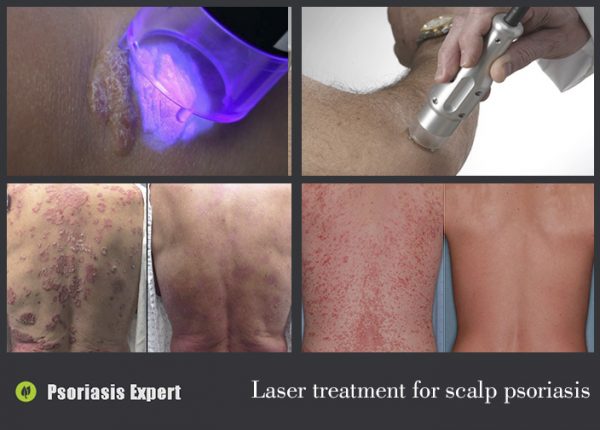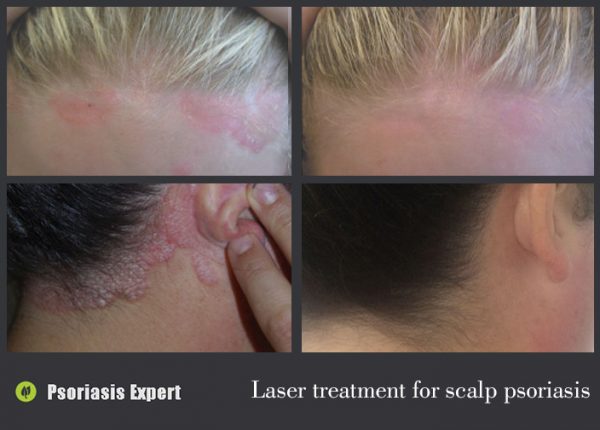Unfortunately, there are no ways to completely get rid of psoriasis. Modern therapy methods, including laser treatment, have proven to be very effective. Laser rays effectively relieve negative symptoms of the disease returning the patient to normal daily life.
Methods of laser therapy
The use of laser beams for the treatment of psoriasis improves the condition of the skin and the whole body. In addition, such therapy is completely safe and with proper use does not cause negative side effects. Unlike medications, laser beam affects directly the affected area of the skin.
Modern medicine uses the following laser methods for the treatment of psoriasis:
- Helium-neon laser.
- Laser-phoresis with infrared laser.
- Pulsed infrared laser.
- Excimer laser.
The most effective modern method is an excimer laser psoriasis treatment. This technique uses gas and ultraviolet rays, which affect strictly the area affected by the disease, feeding cell tissues and accelerating the recovery processes.
Advantages of laser for psoriasis
Psoriasis is characterized by periodic relapses. Physiotherapeutic procedures, medicines, diets are used for the treatment of psoriasis. Laser treatment significantly speeds up the recovery process.
This method has the following advantages:
- ease of use;
- safety;
- painless of procedure;
- effectiveness.
The mechanism of action
New method of laser surgery for psoriasis has the following effects on the body:
- relieves soreness;
- improves regeneration of the affected skin;
- restorative and immunomodulating;
- improves general condition of the patient.
During psoriasis, an accelerated cell division occurs in some skin areas. In the area of psoriatic plaques, the level of keratin increases. Keratin is able to absorb rays of a certain length. Having received certain dose of radiation, the cells containing an increased level of keratin die. This is the essence of how laser technology works: it helps to destroy damaged cells without affecting healthy tissues.
The laser also helps to reduce the number of lymphocytes in the areas affected by psoriasis plaques. This property can cause a prolonged remission.
The doctor needs to find out whether there are any contraindications for the patient to conduct the procedure. Additional studies may be appointed if necessary. To accurately calculate the light energy, the doctor must determine the patient’s phototype. The patient is told all necessary information about the method of treatment.
Procedure
Laser therapy does not require anesthesia or special preparation. The patient does not feel any discomfort during the procedure – only slight tingling sensations. The procedure is fast and takes about 2 minutes.
In order to reach the desired effect, during treatment it is recommended to adhere to a diet, to limit the use of alcohol, and quit smoking.
Laser procedures are usually carried out twice a week for 2-3 weeks. A positive result will become noticeable after the first procedure.
After treatment, the remission usually lasts about 6 months. In some cases, the symptoms disappeared for 3 years. It is important to remember that the laser will help to solve the cosmetic problem, and not cure the disease forever. Only complex treatment will help to treat psoriasis.
Contraindications for use
Before laser treatment, the doctor must assess general condition of the patient. Although such therapy is safe, there are still a number of conditions and diseases in which it is not prescribed:
- Insulin-dependent patients might have some problems with the healing of skin pathologies, so unexpected reactions may occur.
- Oncological neoplasms. Laser therapy can accelerate the growth of tumors.
- The flashes of light during therapy can trigger an attack in patients suffering from this disease.
- This treatment is not recommended for pregnant women as their bodies are being completely reconstructed and the reaction to this procedure is unknown.
- Viral diseases. The body weakened by viral pathologies should not be exposed to laser radiation.
- Keloid scars. Laser treatment can provoke the growth of these scars.
Laser therapy is contraindicated for Afro-Americans. They have 6 phototype and irradiation can provoke the formation of increased pigmentation.
Treatment of psoriasis with a laser method is a good way to get rid of the unpleasant manifestations of psoriasis. The procedure should carried out be under close supervision of a doctor and it is recommended to conduct an examination of the skin every week.

 (1 votes, average: 4.00 out of 5)
(1 votes, average: 4.00 out of 5)
